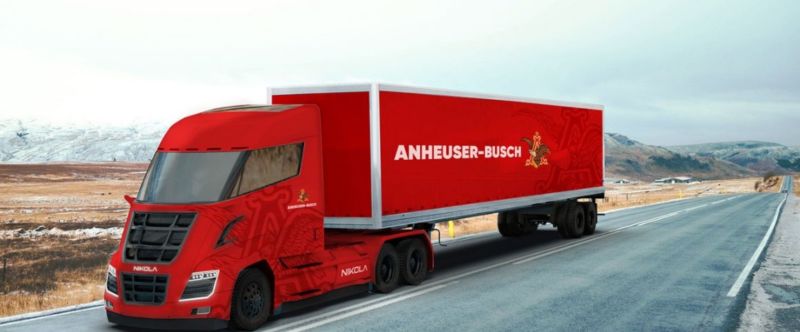
On a quarterly financial call Wednesday afternoon, Tesla CEO Elon Musk briefly spoke about a new lawsuit filed by Nikola Motor Company, a Salt Lake City-based hydrogen fuel cell truck startup. Musk said it was a “laughable lawsuit from some company called ‘Nikola.'”
Whatever the merits of the lawsuit itself, large shipping companies like US Xpress and Ryder think Nikola Motor Company is more than just “some company.” Now, it seems, Anheuser-Busch, one of the largest beer producers in the US and a subsidiary of multinational conglomerate AB InBev, is getting on the Nikola truck train, too. On Thursday, Anheuser-Busch announced that it would buy a sizable 800 hydrogen fuel cell trucks from Nikola Motor company to be delivered between 2020 and 2025.
Like Tesla, Nikola has yet to deliver a zero-tailpipe-emissions truck to a customer. Unlike Tesla, the company has not yet delivered any kind of mass-produced vehicle to a customer at all.
But the promise of fast refueling and nearly 1,200 miles of range on a stack of hydrogen-charged lithium batteries has freight companies willing to bet on the technology. In the lawsuit it filed this week against Tesla, Nikola said it had already received pre-orders for 7,000 trucks. It’s hard to tell if that number is inflated, though. Nikola allows reservations with no money down, whereas reports suggest Tesla requires potential buyers to be at least $20,000 worth of serious about buying a Tesla Semi.
Still, Nikola is confident enough in the demand for its trucks that it’s currently building a $1 billion manufacturing plant in Arizona outside of Phoenix and plans to move company headquarters to Phoenix later this year.
The Anheuser-Busch deal seems a bit more serious than a reservation with no money down, although the details of the agreement were not made public. According to Nikola spokesperson Colleen Robar, Nikola will build 28 fueling stations along Anheuser-Busch’s busiest routes as part of the terms of the agreement. Robar declined to specify what those routes were. Anheuser-Busch’s media contact did not respond to a request for comment.
The Los Angeles Times reports that Anheuser-Busch has also put money down for 40 Tesla electric Semis as part of its goal to convert its entire long-haul fleet to renewable energy sources by 2025.
Skepticism of Nikola Motor Company is not completely unwarranted. It has only just begun construction of two hydrogen fueling stations, and other companies like Toyota have been banking on the success of fuel cell vehicles for a long time without really being able to create a substantial market. Hydrogen is expensive to transport, so refueling stations can’t exactly copy gas station business models with deliveries of hydrogen at regular intervals.
Instead, Nikola is hoping to make its own hydrogen at its refueling stations with the help of a Norwegian firm called Nel Hydrogen. Nel is providing the machinery for the refueling stations, which any hydrogen-based vehicles will be able to use. For Nikola trucks, fuel will be bundled into the price of the truck.
Nikola said that the Nel Hydrogen system will electrolyze water to make hydrogen, rather than use natural gas reformation, for example. Robar told Ars via email that there would be “no concerns about other special elements that could add cost or sourcing issues… Only PEM (proton exchange membrane) fuel cells and electricity.”
According to the company, it takes 55kWh to make one kilogram of hydrogen, and each truck “is anticipated to consume around 50-75kgs per day.” That suggests that at the high end, it would require a little over 4MWh of renewable energy to refuel a Nikola truck. The good thing is, once it’s made, hydrogen fuel can be stored.
Logistical hurdles aside, if Nikola succeeds it would be another step forward in reducing greenhouse gases from one of the most polluting yet important sectors of the American economy. “Once fully implemented, the carbon reductions gained from these 800 trucks will reduce the brewer’s carbon emissions from logistics by more than 18 percent—equivalent to taking more than 13 thousand passenger vehicles off the road annually,” Anheuser-Busch wrote in its press release.
https://arstechnica.com/?p=1302989

